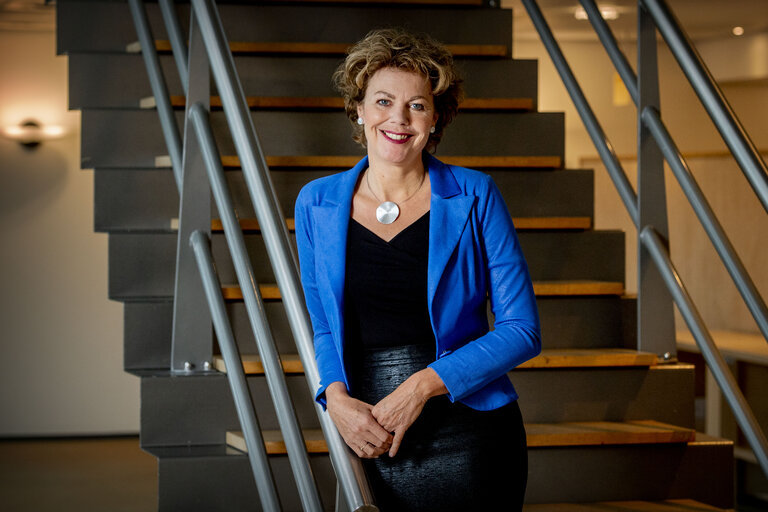
Ingrid Thijssen, president VNO-NCW: 'We must become more innovative, sustainable, inclusive'
For a year and a half now, Ingrid Thijssen has been president of VNO-NCW. 'A rollercoaster,' is how she herself characterizes this period. How is the Dutch economy doing? How do we make it future-proof and what are the main issues? And what are the opportunities and threats for Dutch industry?
We are moving toward a complete transformation of basic industry. In this, circularity is certainly crucial."
'Before corona, I said yes to this job. And suddenly we were in a lockdown and a large part of our constituency - stores, hotels and restaurants, amusement parks - was proverbially on fire,' says Ingrid Thijssen, president of VNO-NCW. 'It was a roller-coaster ride, in which, through excellent cooperation with the trade union movement, we were able to help entrepreneurs through the worst misery with support packages. An advantage was that because of that crisis I got to know all the ministers very closely in record time.'
Major changes
At the time of the pandemic, VNO-NCW was working hard on the vision document 'Entrepreneurship for broad prosperity.' 'Indeed, that was proudly presented a year ago. We are facing major changes; worldwide and here in the Netherlands. It is our task to guide the entrepreneurial Netherlands, with all its members and the government, through these changes, so that we can achieve broad prosperity with a strong economy. That means we must become more innovative, sustainable and inclusive. We at VNO-NCW must ensure that the conditions for this are in place.
Concrete rot
Roughly speaking, according to Thijssen, there are three major tasks for the Netherlands, which VNO-NCW is working on. 'The sustainability task is the first. We need to accelerate the implementation of all the good plans that exist for energy transition. For example, with fast lanes for permits and special procedures. Otherwise we will not succeed with the hydrogen and energy infrastructure of the future. And that's where the tension with the nitrogen problem comes around the corner.' Dealing with the tight labor market is the second challenge. 'We are working with all technical industries on plans to address that shortage,' Thijssen said. 'Companies could, for example, get a good influx going with their own training courses, as was successfully done at the NS. We can also encourage lateral recruitment and do more to improve the image of engineering and technology. Technology offers many interesting, challenging jobs with good earnings. We need to showcase that better.' The third issue is our economy and earning power. 'That's what I worry about. To pay for all the government's plans, the engine of the economy must be able to keep running. Our business climate is subject to concrete rot. There are too few housing units. Our mainports, crucial for international connectivity, are under pressure. So is our education system, where scores are falling and where we are training too few skilled workers.'
Resilient
In addition, Thijsen is concerned about the consequences of the war in Ukraine. 'We are in an energy and raw material crisis, which is reinforced by problems in logistics chains. Because of corona and now because of the situation in Ukraine, you see how vulnerable chains are. On the other hand, you also saw how quickly the market is able to solve problems again. But Europe must pursue a more active and offensive raw materials policy. That is of strategic importance. Moreover, every energy crisis in history has led to a recession, and energy prices are likely to remain high for years as Europe moves away from gas and oil from Russia. Many entrepreneurs are struggling to pass on increased prices and are under pressure. From greenhouse horticulture to construction to food processing to brick makers to logistics. What is positive is that during the pandemic, despite all the misery and accumulated debt, the Dutch economy also proved to be very resilient and innovative.'
Communications
Looking at the big changes and challenges, is there any right for petrochemical industry to exist in the Netherlands in the long run? 'Absolutely,' believes Thijssen. 'After all, few people realize all the products we use every day, thanks to this kind of basic industry. So I'm not worried about that. But it is going to change completely because of the energy transition. More electric processes, hydrogen, et cetera. We are moving toward a complete transformation of basic industry. Certainly circularity is also crucial in this. Europe is not rich in raw materials. Not only to become sustainable but also to be independent, we have to reuse raw materials to the maximum extent. This is an even more complicated change than the energy transition. But necessary. Fortunately, corona did make us realize more the importance of having our own industry as well. Finally, it is important that we as an industry continue to actively seek out society. Share your dilemmas. Engage with the neighborhood and local or national politicians and NGOs. We have a densely populated country and communication is very important for support and your license to operate.'

